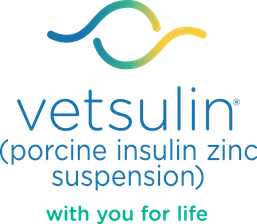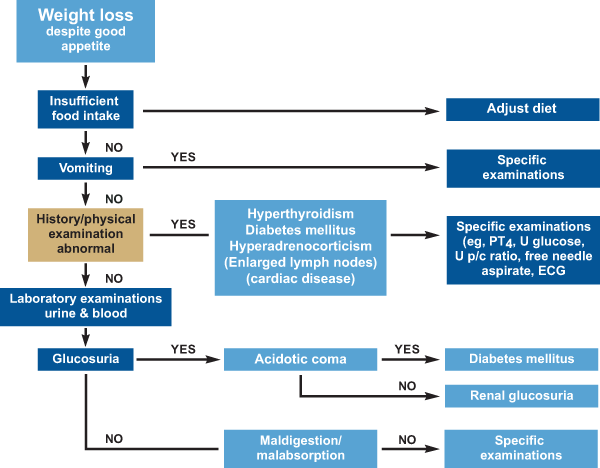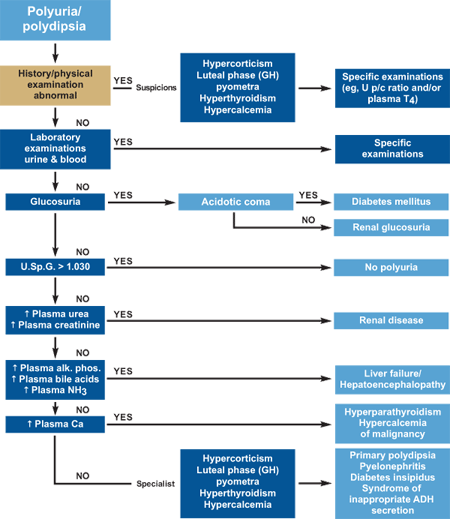

Differentiating Factors
Read More About Feline Diagnosis & Management
Common Factors Associated with Diabetes Mellitus
Weight Loss Despite a Good Appetite
Noticeable weight loss in a cat may cause a concerned cat owner to visit the veterinarian. Although diabetes mellitus is a common diagnosis, other factors that can cause these clinical signs should be considered. The following algorithm can help you make an accurate diagnosis:

Adapted from Rijnberk A. Clinical Endocrinology of Dogs and Cats. Kluwer Academic Publishers, NL. 1996:222.
Polyuria/Polydipsia
Quite often, cat owners visit their veterinarian when their cat is urinating in the house or consuming large amounts of water. Although diabetes mellitus is a well-known cause of polyuria and polydipsia, there are many other factors to consider. The following algorithm can help you identify the cause.

Adapted from Rijnberk A. Clinical Endocrinology of Dogs and Cats. Kluwer Academic Publishers, NL. 1996:222.
Help Your Practice Manage Diabetes Mellitus
Check out these tools and resources to help manage feline diabetes.

Blood Glucose Curve Generator
Create a blood glucose curve to monitor and evaluate diabetes treatments.

Client Discharge Form
Create a customized, printable form for clients about their new diagnosis.

Diabetes Resources
Access online tools and more to support staff and pet parents.
No items to show.
Read More About Feline Diagnosis & Management
Important Safety Information:
Vetsulin® should not be used in dogs known to have a systemic allergy to pork or pork products. Vetsulin is contraindicated during periods of hypoglycemia. Keep out of reach of children. As with all insulin products, careful patient monitoring for hypoglycemia and hyperglycemia is essential to attain and maintain adequate glycemic control and prevent associated complications. Overdosage can result in profound hypoglycemia and death. The safety and effectiveness of Vetsulin in puppies, breeding, pregnant, and lactating dogs has not been evaluated. See package insert for full information regarding contraindications, warnings, and precautions.
References:
1. Martin GJ, Rand JS. Pharmacology of a 40 IU/ml porcine lente insulin preparation in diabetic cats: findings during the first week and after 5 or 9 weeks of therapy. J Feline Med Surg. 2001;3(1):23–30. 2. Vetsulin® (porcine insulin zinc suspension) [Freedom of Information Summary]. Millsboro, DE: Intervet Inc.; 2008. 3. Data on file, Merck Animal Health. 4. Graham PA, Nash AS, McKellar QA. Pharmacokinetics of porcine insulin zinc suspension in diabetic dogs. J Small Anim Pract. 1997;38(10):434–438. 5. Martin GJ, Rand JS. Pharmacokinetic and Pharmacodynamic Study of Caninsulin in Cats with Diabetes Mellitus. 2000: Internal Study Report. 6. Feldman EC, Nelson RW. Canine and Feline Endocrinology and Reproduction. 3rd ed. St. Louis, MO: Saunders; 2004:539–579. 7. Tennant B, ed. BSAVA Small Animal Formulary. 4th ed. Gloucestershire, UK: British Small Animal Veterinary Association; 2002. 8. Feldman EC, Nelson RW. Canine and Feline Endocrinology and Reproduction. 3rd ed. St. Louis, MO: Saunders; 2004:486–538. 9. Reusch C. Feline diabetes mellitus. In: Ettinger SJ, Feldman EC, eds. Textbook of Veterinary Internal Medicine. 7th ed. St. Louis, MO: Saunders; 2010:1796–1816. 10. Nelson RW. Canine diabetes mellitus. In: Ettinger SJ, Feldman EC, eds. Textbook of Veterinary Internal Medicine. 7th ed. St. Louis, MO: Saunders; 2010:1782–1796. 11. Burgaud S, Riant S, Piau N. Comparative laboratory evaluation of dose delivery using a veterinary insulin pen. In: Proceedings of the WSAVA/FECAVA/BSAVA congress; 12–15 April 2012; Birmingham, UK. Abstract 121. 12. Burgaud S, Guillot R, Harnois-Milon G. Clinical evaluation of a veterinary insulin pen in diabetic dogs. In: Proceedings of the WSAVA/ FECAVA/BSAVA congress; 12–15 April 2012; Birmingham, UK. Abstract 122. 13. Burgaud S, Guillot R, Harnois-Milon G. Clinical evaluation of a veterinary insulin pen in diabetic cats. In: Proceedings of the WSAVA/FECAVA/BSAVA congress; 12–15 April 2012; Birmingham, UK. Abstract 45. 14. Davison LJ, Walding B, Herrtage ME, Catchpole B. Anti-insulin antibodies in diabetic dogs before and after treatment with different insulin preparations. J Vet Intern Med. 2008;22:1317-1325. 15. Banfield State of Pet Health 2016 Report. p 12-13.
